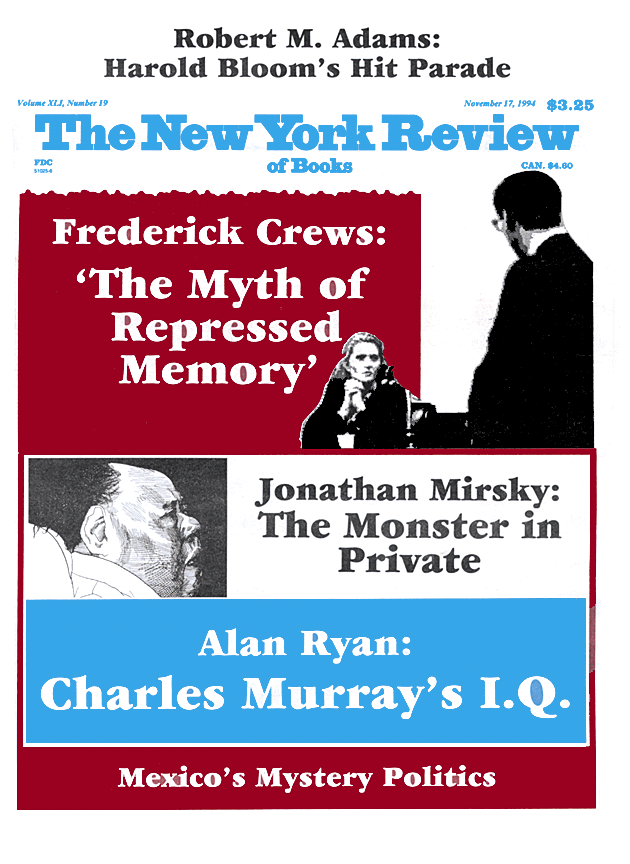In response to:
The Culture Wars from the October 6, 1994 issue
To the Editors:
Louis Menand’s review of Richard Bernstein’s Dictatorship of Virtue [“The Culture Wars,” NYR, October 6] faults alleged discrepancies, yet Professor Menand himself plays very loose with the facts. Menand’s technique here, witting or not, becomes an instructive example of the denial, ridicule, and obfuscation practiced by many proponents of the academic left in justifying a widening intolerance that punishes dissent. Inasmuch as Menand callously selects my harassment and ostracism in the English Department at the University of Texas at Austin (which were in my view even worse than Bernstein’s portrayal) as a prime example of Bernstein’s skewed narratives, and since my academic reputation is somewhat at stake, it is only fair that I be allowed to respond in print to the misrepresentations.
As I made clear to Bernstein, and as he emphasized in his book, I did not, as Menand would have it, leave Texas because of the controversy over the politicization of the English 306 course. I would hardly sacrifice a tenured full professorship over a single course, however deeply I objected to the distortion of its priorities. What Menand hides in his summary is what Bernstein made a point of reporting—the four-year campaign by faculty and student radicals against me merely because I had the conscience and courage to cast a lone vote in a faculty meeting against one of their cherished alterations in the English graduate program. For this transgression in 1987 I was subjected to an unrelenting vilification that did not even end with my exile from the department in 1991. That lengthy persecution, and my chairman’s misleading press releases and newspaper and radio interviews, gave me the nerve in 1990 to notify the community about the slanted nature of the revamped E.306 course. Also missing from Menand’s review is any mention of the assigned Paula Rothenberg textbook (titled in its most recent edition Race, Class, and Gender in the United States) that promises to “explore each form or aspect of oppression” and still seems manifestly unsuitable for a required first-year English composition course.
Menand is dead wrong about the supposed neutrality of the American Association of University Professors regarding my banishment; Ernst Benjamin, identifying himself as General Secretary of the AAUP, publicly and repeatedly dismissed the notion that I had been targeted for removal by campus radicals, declaring that he was “familiar” with my case when in fact he had never contacted me. Benjamin apparently was influenced by a fifteen-page hate-mongering piece of character assassination sent anonymously to the AAUP from Austin, Texas. Instead of protecting a victim of the current academic bullies, the AAUP readily condoned and excused their harassment. In an impassioned defense of the AAUP and its former president Linda Ray Pratt, Menand attests that he interviewed Pratt about the University of Texas controversy; it seems odd that during those conversations Pratt presumably never referred to the five letters I wrote to her protesting her officer’s published attacks on me before I left Texas.
What was done to me and other moderate English professors at U.T. Austin was unprovoked, unprincipled, and cowardly. Richard Bernstein, a prominent journalist known for his meticulous research, chose not to look the other way.
Alan Gribben
Montgomery, Alabama
Louis Menand replies:
Nowhere in my review did I presume to judge the merits of Mr. Gribben’s grievance against his former colleagues at the University of Texas. I only said that Richard Bernstein’s account of the AAUP’s role in that case was, in my judgment, incomplete and misleading. I am not a “proponent of the academic left,” whatever that means.
This Issue
November 17, 1994


